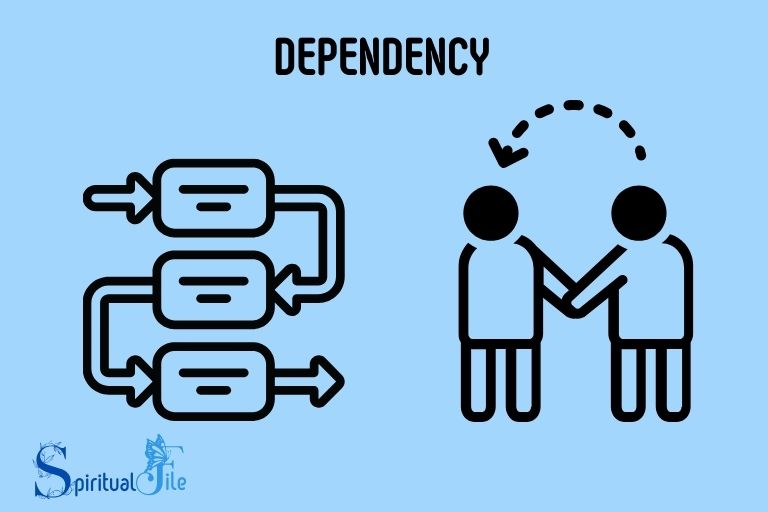Examples of Being Spiritually Enslaved: Values!
Spiritual enslavement refers to a condition where an individual’s spiritual beliefs, values, or experiences are controlled or manipulated by external factors or entities.
These factors can include religious institutions, spiritual leaders, or even personal fears and misconceptions.
Spiritual enslavement can manifest in several different ways. For instance, it can lead to a person blindly following religious principles without a personal understanding or conviction.
It can also result in a person being overly dependent on spiritual leaders for guidance and unable to make independent spiritual decisions.
In extreme cases, spiritual enslavement could make someone feel guilty or fearful of divine punishment if they question or deviate from established spiritual norms.
Experiencing spiritual enslavement can lead to feelings of guilt, fear, confusion, and even spiritual stagnation.
It is important to remember that everyone is entitled to their own spiritual journey and understanding.
A healthy spiritual life involves personal growth, questioning, learning, and personal connection to your beliefs. Everyone has the right to spiritual freedom and autonomy.
10 Examples: Being Spiritually Enslaved
| Examples | Description |
|---|---|
| Fear-based Beliefs | Believing out of fear and not of faith, making decisions based on fear. |
| Guilt and Shame | Feeling constantly guilty or shameful because of past actions. |
| Legalism | Obedient to the law to the point that it overtakes faith. |
| Materialism | Obsession with worldly items over spiritual growth. |
| Idolatry | Worshipping people or things instead of a divine entity. |
| Addictive Behaviours | Behaviours that create a mental, emotional, and spiritual enslavement. |
| Obsession with Self | Focusing only on self-gratification and ignoring spiritual responsibilities. |
| Spiritual Bypassing | Using spirituality to avoid dealing with emotional issues. |
| Perfectionism | Believing that one must be perfect to be accepted or loved by a divine entity. |
| Co-dependency on spiritual leaders | Relying heavily on spiritual leaders for guidance without developing personal spiritual understanding. |
Key Takeaway

Five Facts About: Being Spiritually Enslaved
Signs Of Spiritual Enslavement
Spiritual enslavement can manifest in various ways, such as excessive dependence on a religious leader for guidance or feeling trapped in oppressive beliefs.
Other signs may include a loss of personal autonomy and an inability to question or think critically about one’s own spiritual path.
Being spiritually enslaved can be a deeply distressing experience that can have a profound impact on a person’s well-being.
It’s important to be aware of the signs of spiritual enslavement, as they can manifest in various ways.
In this section, we will explore three key signs of spiritual enslavement: dependence on a religious leader, loss of personal agency and critical thinking, and fear and guilt-based manipulation.
Dependence On A Religious Leader
- Placing complete trust and reliance on a religious leader can be a sign of spiritual enslavement.
- The individual may feel obligated to seek permission or approval from the leader for personal decisions and actions.
- They may prioritize the leader’s teachings and interpretations over their own beliefs and intuition.
- The religious leader may be seen as infallible, with their words being treated as absolute truth.
- Any criticism or questioning of the leader’s teachings is often discouraged or seen as disobedience.
Loss Of Personal Agency And Critical Thinking
- Spiritual enslavement can lead to the erosion of an individual’s personal agency and ability to think critically.
- The person may have difficulty making decisions independently without seeking guidance from the religious group or leader.
- Their thoughts and beliefs are heavily influenced by the teachings of the group, leaving little room for independent thought.
- Critical thinking and questioning are often discouraged, with blind acceptance being the norm.
- The individual may feel trapped in a cycle of conformity, unable to deviate from the group’s beliefs or practices.
Fear And Guilt-Based Manipulation
- Fear and guilt are frequently employed as tools of manipulation within spiritually enslaving environments.
- The individual may be constantly reminded of the consequences of leaving the group, such as eternal damnation or isolation.
- They may be made to feel guilty for questioning or doubting the teachings of the group.
- External threats and punishments, such as excommunication or ostracism, may be utilized to control and manipulate members.
- Fear tactics may include the use of apocalyptic scenarios or the belief in a cosmic battle between good and evil.
In identifying these signs of spiritual enslavement, it is essential to approach the subject with empathy and understanding.
Recognizing these signs is the first step towards supporting individuals who may be caught in spiritually enslaving situations and helping them regain their freedom of thought and agency.
Effects Of Spiritual Enslavement
Spiritual enslavement can manifest in various ways, such as blindly following a religious leader or becoming obsessed with dogmatic beliefs.
This can lead to the suppression of personal growth, critical thinking, and the loss of individuality.
Being spiritually enslaved can have profound effects on an individual’s emotional and mental well-being, self-worth and identity, as well as their social relationships.
Emotional and mental manipulation: under the influence of spiritual enslavement, individuals often experience emotional and mental manipulation, which can lead to a range of negative consequences:
- Constant fear and anxiety: Spiritual enslavement typically involves creating a climate of fear and anxiety, where individuals are constantly on edge and worried about making mistakes or disobeying their spiritual leaders.
- Guilt and shame: Manipulative tactics used in spiritual enslavement can often lead individuals to feel an overwhelming sense of guilt and shame for their perceived failures or shortcomings.
- Cognitive dissonance: In order to maintain their beliefs in the face of contradictory evidence or experiences, individuals may experience cognitive dissonance, which can cause significant distress and confusion.
- Thought control: Spiritual enslavement often involves strict thought control, where individuals are discouraged or prohibited from questioning the teachings or doctrines of their spiritual leaders.
- Loss of critical thinking skills: In an environment of spiritual enslavement, individuals may lose their ability to think critically and independently, becoming reliant on the direction and guidance of their leaders.
Diminished Self-Worth And Identity: Spiritual Enslavement Can Have A Profound Impact On An Individual’S Self-Worth And Sense Of Identity, Leading To:
- Self-doubt and low self-esteem: The constant manipulation and control inherent in spiritual enslavement can leave individuals feeling unworthy and lacking in confidence.
- Loss of personal autonomy: Individuals in spiritually enslaved situations often have their personal autonomy eroded, as their identities become subsumed by the demands and expectations of their leaders.
- Depersonalization and identity crisis: The coercive tactics used in spiritual enslavement can cause individuals to lose touch with their authentic selves, leading to a sense of depersonalization and an identity crisis.
Social Isolation And Alienation: Spiritual Enslavement Frequently Results In Social Isolation And Alienation From Friends, Family, And The Broader Community. This Can Manifest In Several Ways:
- Withdrawal from loved ones: Under the influence of spiritual enslavement, individuals often withdraw from their non-believing friends, family, and peers, feeling compelled to prioritize their spiritual group.
- Estrangement from support networks: The control exerted by spiritual leaders can cause individuals to distance themselves from supportive networks, as their leaders encourage them to rely solely on the group for emotional and practical needs.
- Stigmatization and rejection: Those who break free from spiritual enslavement may face stigmatization and rejection from their former peers and community, further exacerbating social isolation.
It is important to recognize and address the effects of spiritual enslavement on individuals, providing support and resources to help them reclaim their emotional well-being, self-identity, and social connections.
Types Of Spiritual Enslavement
A few examples of spiritual enslavement include religious cults, psychic dependency, and addiction to spiritual practices.
These forms of bondage can hinder personal growth and autonomy, trapping individuals within restrictive belief systems or unhealthy dependencies.
Cults and high-control groups:
- Cults and high-control groups are manipulative organizations that exploit vulnerable individuals for their own gain.
- These groups often use mind control techniques to isolate members from their families, friends, and the outside world.
- Members are subjected to strict rules, forced obedience, and psychological manipulation to ensure their complete loyalty.
- Brainwashing and indoctrination methods are used to strip individuals of their critical thinking abilities, leaving them reliant on the cult’s leadership.
- Financial exploitation is common, with members coerced into donating large sums of money or handing over their assets.
Abusive religious institutions:
- Abusive religious institutions exert control over their followers through fear, guilt, and shame.
- These institutions use religious doctrines and teachings to justify their abusive behavior towards members.
- Leaders often claim to have divine authority, demanding unquestioning obedience from their followers.
- Physical, emotional, and sexual abuse may occur within these institutions, leaving victims traumatized and spiritually crushed.
- Religious shunning and ostracism are used to silence dissent and maintain control over individuals who may question the institution’s practices.
New age spiritual exploitation:
- New age spiritual exploitation refers to individuals or organizations that manipulate and deceive individuals seeking spiritual growth and fulfillment.
- These exploiters may offer healing sessions, workshops, or products claiming to provide spiritual enlightenment.
- Unscrupulous practitioners may use tactics such as gaslighting, misinformation, and fear-mongering to keep their clients dependent on them.
- Financial exploitation is prevalent, with exorbitant fees charged for services or products that have little to no actual benefit.
- Victims of new age spiritual exploitation often find themselves entangled in a web of false promises and disillusionment.
Spiritual enslavement takes many forms and can happen to people from all walks of life.
By understanding the different types of spiritual enslavement, we can raise awareness and help those who may be trapped in these harmful situations.
It is important to be vigilant and listen to our inner voice when engaging with any spiritual group or leader, ensuring our own spiritual well-being and autonomy.
How Can Honesty Lead to Spiritual Enslavement?
Practicing moral and spiritual honesty values is crucial, but unchecked honesty can lead to spiritual enslavement. When honesty becomes dogmatic and rigid, it can create guilt and fear of deviating from a perceived moral code. True spiritual growth comes from a balance of honesty and compassion for oneself and others.
FAQ About on Examples Of Being Spiritually Enslaved
What Does It Mean To Be Slaves Of God?
To be slaves of god means to submit willingly and wholeheartedly to his authority and guidance. It implies dedicating one’s life to serving and obeying god’s commands and will.
As slaves of god, we acknowledge and accept his superiority and sovereignty over us, recognizing that he knows what is best for us.
By surrendering to god’s will, we find true freedom and fulfillment, as we trust in his wisdom and choose to follow his teachings.
Being slaves of god involves living a life devoted to bringing glory to him, seeking his guidance in all aspects of life, and striving to live in accordance with his principles of love, justice, and righteousness.
It is a relationship based on love, trust, and reverence, where we find purpose and a sense of belonging in god’s plan for our lives.
How Does Spiritual Enslavement Affect Mental Well-Being?
Spiritual enslavement can negatively impact mental well-being by causing feelings of anxiety, confusion, and a sense of being trapped.
What Are The Signs Of Being Spiritually Enslaved?
Signs of being spiritually enslaved may include a loss of personal freedom, feeling controlled by others’ beliefs, and experiencing a lack of inner peace.
Can Someone Break Free From Spiritual Enslavement?
Absolutely! By seeking self-awareness, questioning limiting beliefs, and embracing personal growth, it is possible to break free from spiritual enslavement.
How Can One Protect Themselves From Spiritual Exploitation?
Protecting oneself from spiritual exploitation involves maintaining healthy boundaries, being discerning of spiritual teachings, and aligning with one’s own inner truth.
Conclusion
To truly understand spirituality and the inherent dangers of being spiritually enslaved, we must recognize the various manifestations it can take in our lives.
The examples highlighted in this blog post shed light on the subtle ways in which we can become enslaved to external forces, relinquishing our freedom and personal growth in the process.
Whether it’s through dogmatic religious beliefs, oppressive ideologies, or the allure of materialistic pursuits, spiritual enslavement can permeate every aspect of our existence.
We must remain vigilant and actively question the norms and expectations imposed upon us by society, ensuring that our own spiritual journey is one of authenticity and individuality.
Only by recognizing and breaking free from these chains can we truly embark on a path of self-discovery, enlightenment, and spiritual liberation.
May this exploration serve as a reminder for all to critically evaluate the beliefs and influences that may be holding us back from true spiritual fulfillment.






